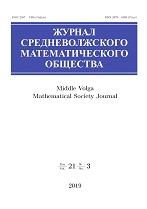|
This article is cited in 1 scientific paper (total in 1 paper)
Mathematics
Numerical study of the rate of convergence of Chernoff approximations to solutions of the heat equation
K. A. Dragunovaa, N. Nikbakhtb, I. D. Remizova
a National Research University – Higher School of Economics in Nizhny Novgorod
b Auckland University of Technology
Abstract:
The article is devoted to construction of examples illustrating (using computer calculation) the convergence rate of Chernoff approximations to the solution of the Cauchy problem for the heat equation. Two Chernoff functions (of the first and second order of Chernoff tangency to the double differentiation operator) and several initial conditions of different smoothness are considered. As an illustration for the initial condition equal to the absolute value of the sine function to the power of five over two, a graph of the exact solution of the Cauchy problem and graphs of the tenth Chernoff approximations given by two different Chernoff functions are plotted. It is visually determined that the approximations are close to the solution. For each of the two Chernoff functions, for several initial conditions of different smoothness and for the approximation numbers up to 11, the error corresponding to each approximation is numerically found. This error is understood as the supremum of the absolute value of the difference between the exact solution and its approximating function. As it turned out, in all the cases studied, the error dependence on the approximation number nearly power-law form. This follows from the fact that the dependence of the error logarithm on the logarithm of the approximation number is close to linear. By finding the equation of the approximating line using linear regression, we find the exponent in the power dependence of the error on the approximation number and call it the order of convergence. These orders for all studied initial conditions are compiled in a table. The empirical dependence of the convergence order on the smoothness class of the initial condition is found on the considered family of initial conditions.
Keywords:
heat equation, Cauchy problem, operator semigroups, Chernoff approximations, rate of convergence, numerical experiment
Citation:
K. A. Dragunova, N. Nikbakht, I. D. Remizov, “Numerical study of the rate of convergence of Chernoff approximations to solutions of the heat equation”, Zhurnal SVMO, 25:4 (2023), 255–272
Linking options:
https://www.mathnet.ru/eng/svmo866 https://www.mathnet.ru/eng/svmo/v25/i4/p255
|

| Statistics & downloads: |
| Abstract page: | 32 | | Full-text PDF : | 13 | | References: | 18 |
|




 Contact us:
Contact us: Terms of Use
Terms of Use
 Registration to the website
Registration to the website Logotypes
Logotypes








 Citation in format
Citation in format 
